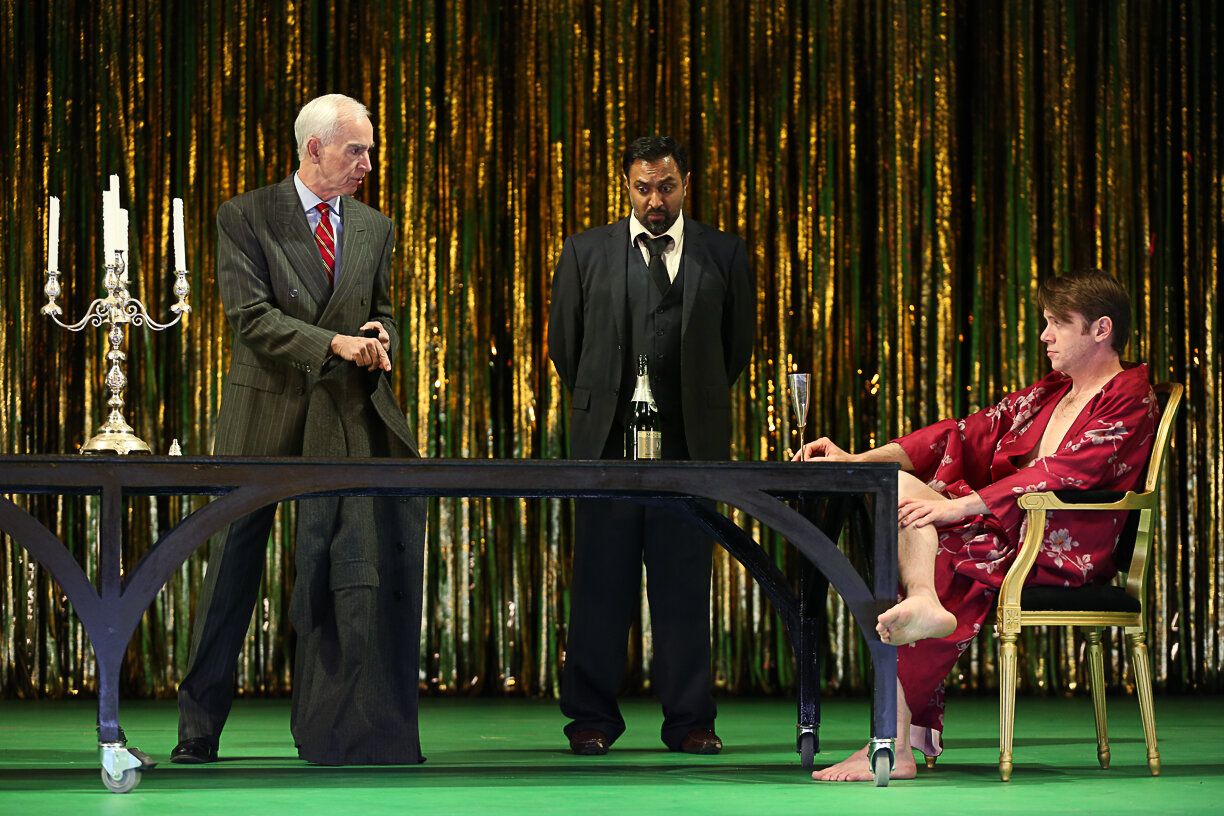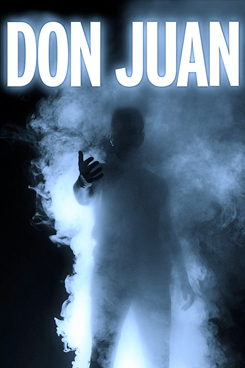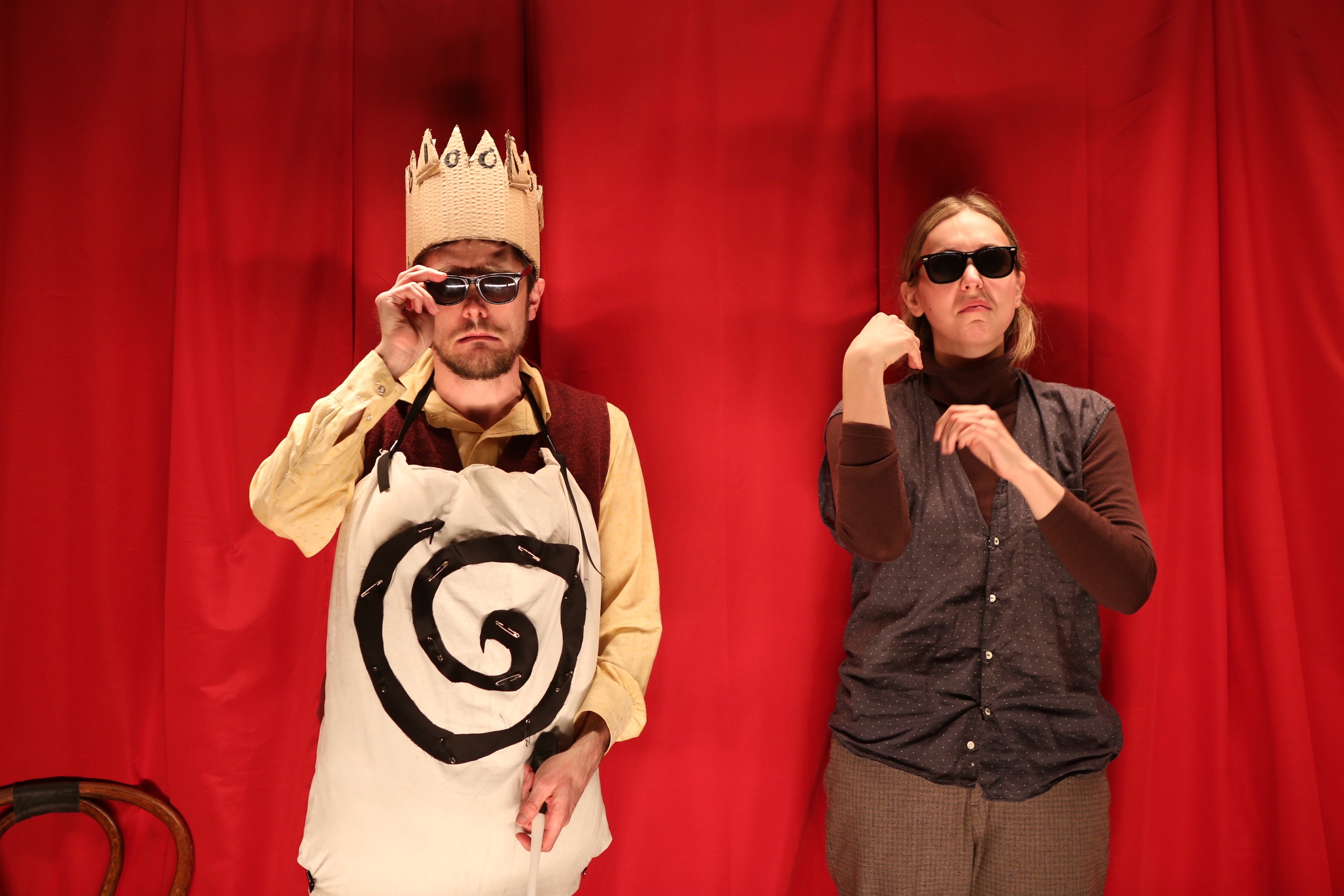Review of Don Juan, Westport Country Playhouse
Molière’s version of Don Juan remains, after all this time, somewhat enigmatic. An antihero, Don Juan is an atheistic libertine who prides himself on seducing women and marrying and abandoning them serially. A new translation and adaptation by Brendan Pelsue, directed by David Kennedy at Westport Country Playhouse, inhabits a cartoonish world that almost saps any gravitas from Don Juan’s many interlocutors. For all his glib narcissicism, Don Juan, played by Nick Westrate with cool hauteur, is at least not afraid to acknowledge his own nature. Everyone else seems more or less a clown. Except perhaps that living statue (Paul DeBoy).
Don Louis (Philip Goodwin), Sganarelle (Bhavesh Patel), Don Juan (Nick Westrate) in Don Juan, Westport Country Playhouse (photo by Carol Rosegg)
The key clown, of course, is Sganarelle (Bhavesh Patel), a practiced lackey to Don Juan through whose view, more or less, the action unfolds. He’s always on the scene, he provides much joking commentary, and his reactions recall Bud Costello. As played by Patel, he’s principled, up to a point, and able to accommodate even the most unpleasant requests from his boss with a philosophic acceptance of his lot in life. He’s owed many back-wages and lets us know he has to play along to get his due. In this, he’s any of us who will stick with a status quo, no matter how undignified, in the hopes that it will pay off.
The fact that Sganarelle’s wages, should he ever be paid, are owed for the part he plays in his master’s unsavory way of life might give him pause, and might give us grounds to see that what Sganarelle earns is his just deserts. And yet one can’t help thinking that there’s insufficient high ground here with which to censure the agreeable fellow. Part Two opens with Sganarelle performing a service that one would think is about as low as it goes—except that it could be considered a role played by a parent to a child.
It’s not a groundless thought, since Don Juan tends to be childlike in his inability to, as they say, “commit.” He’s flighty and capricious almost in self-defense, to avoid any world in which he must grow up and mean what he says. Late in the play, his father, Don Louis (Philip Goodwin), pays him two visits to upbraid his wayward son and in both cases gets the short end of the stick, though in the second he thinks his son has reformed. Dona Elvira (Suzy Jane Hunt), Don Juan’s most recent wife whom he lured away from a convent, gets even more humiliating treatment in her two visits. Both characters, who might be taken as examples of the morality Don Juan deplores, are also, in their stock conventions, tiresome company who deserve to be the butt of a joke.
And that’s finally what gives this updated, world premiere adaptation its bite. Pelsue lets Molière’s sense of human foible undermine anyone who might stand above anyone else. Once upon a time, that outlook met with censorship, causing certain parts of the play to be suppressed. Now, we’re familiar, in our carnival democracy, with the notion that an even playing-field means everyone’s the lowest common denominator, and to suggest otherwise, as Don Juan sees, is to be hypocritical.
Beggar (Philip Goodwin), Don Juan (NIck Westrate) in Don Juan, Westport Country Playhouse (photo by Carol Rosegg)
And yet, for all its ironies, the play isn’t cynical. It sets two or three saving graces or higher laws against the naked self-interest of its hero. One is the question of what one owes to one’s God or one’s faith, enacted here by a Beggar (Goodwin) who won’t blaspheme even for the sake of a gold coin Don Juan tempts him with. Another is the question of honor, which comes up in the comic disputation between Don Carlos (Jordan Bellow), whom Don Juan saved from assault, and his brother Don Alonzo (Bobby Roman), who says the brothers must kill Don Juan for his treatment of their sister Dona Elvira. Molière is able to mock such honor codes while also showing how fidelity to them makes things fairer. And the brothers, in their phlegmatic discourse in the midst of a vendetta, are delightful fun.
Don Carlos (Jordan Bellow), Don Alonzo (Bobby Roman) in Don Juan, Westport Country Playhouse (photo by Carol Rosegg)
Finally, there is love. Don Juan seems incapable of it and indifferent to it when it comes to him from another, but there is a sense in which the profligate’s fate is earned by his disdain of those truly concerned for him, like his father and Dona Elvira and even, at least for the sake of his wages, Sganarelle. Don Juan flaunts God, honor and love and goes to his end wondering what all the fuss was about.
Kennedy’s treatment of the material moves quickly and throws several vivid clowns at us. Besides the indefatigable Sganarelle, there’s Carson Elrod as a peasant Pierrot, who is energetically dim, and as the creditor Dimanche who is out of his depth. There’s Ariana Venturi as Charlotte, the suitably dim beloved of Pierrot who lets herself get romanced by Don Juan—and Venturi gets credit for giving the character a sufficient hint of depth to suggest she might just be the jewel in the mud Don Juan pretends he takes her for. As Mathurine, another woman whom Don Juan has promised to marry, Claudia Logan is scrappy and energetic, and, as the Ghost, quite a vision.
Pierrot (Carson Elrod), Charlotte (Ariana Venturi) in Don Juan, Westport Country Playhouse (photo by Carol Rosegg)
The costumes by Katherine Roth and the set designs by Marsha Ginsberg are equally colorful, combining a flair for amusing touches, like Don Juan’s T-shirt with “narcissist,” printed to be read by the shirt’s wearer, and the piles of plastic bags of trash next to a Coke machine in the scene with the peasants, or Don Juan’s gold lamé suit and a background Fragonard in the first scene.
Dona Elvira (Suzy Jane Hunt), Don Juan (Nick Westrate) in Don Juan, Westport Country Playhouse (photo by Carol Rosegg)
The play’s Second Part is shorter and lacks the outright fun of the First Part and that’s where we start to sense that the cavalier tone of the play was a distraction from something more dire. A comeuppance will come. Whether you like him or not, there is a certain sexiness in Don Juan’s insistence that girls just wanna have fun and that he shouldn’t deny himself to any who are so inclined. And, anyway, he’s not nearly as vile as a contemporary libertine like Jeffrey Epstein. Still, the conclusion shows that belittling the claims of others is if no avail at the final judgment.
Don Juan
By Molière
A world premiere translation and adaptation by Brendan Pelsue
Directed by David Kennedy
Scenic Design: Marsha Ginsberg; Costume Design: Katherine Roth; Lighting Design: Matthew Richards; Original Music & Sound Design: Fitz Patton; Fight Director/Intimacy Coach: Michael Rossmy; Associate Scenic Design: Samuel Vawter; Props Supervisor: Karin White; Production Dramaturg: Dana Tanner-Kennedy; Production Stage Manager: Shane Schnetzler
Cast: Jordan Bellow, Paul DeBoy, Carson Elrod, Philip Goodwin, Suzy Jane Hunt, Claudia Logan, Bhavesh Patel, Bobby Roman, Ariana Venturi, Nick Westrate
Westport Country Playhouse
November 5-23, 2019







